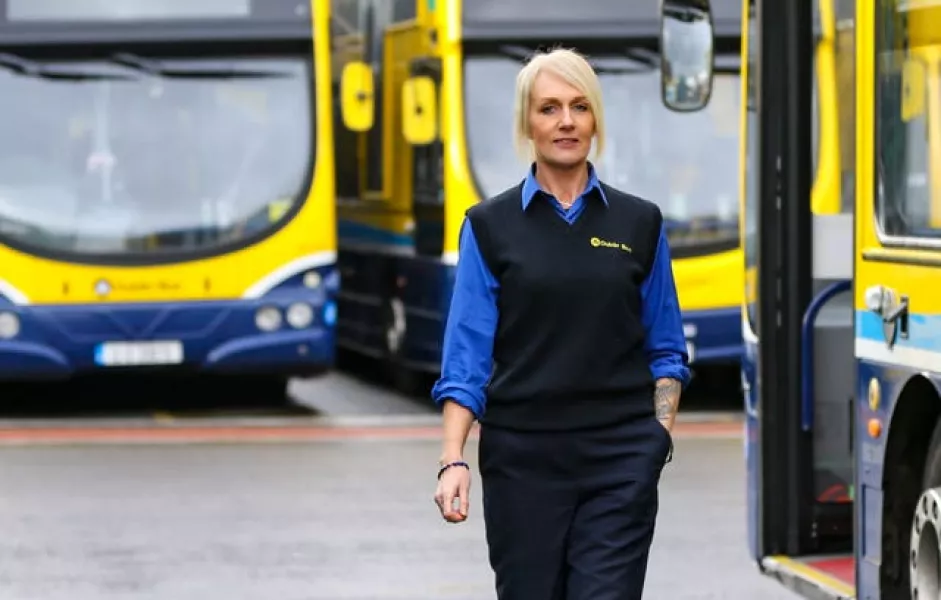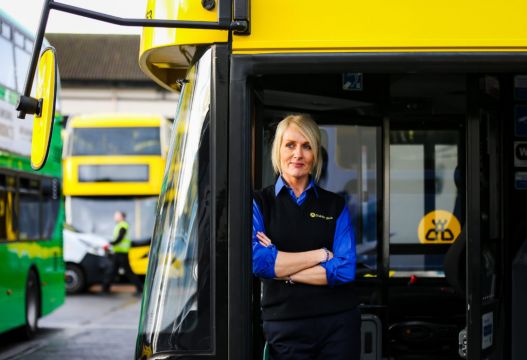Dorota Dzikon loves working as a bus driver so much, she is encouraging her wife to join Dublin Bus too.
Yet she remains one of the few women working for Dublin Bus, which has struggled for years to attract female drivers.
Women make up less than 6 per cent of Dublin Bus drivers, despite a campaign two years ago aimed at boosting numbers.
The capital’s bus service currently has 148 female drivers out of a total of 2,716.
The number of female drivers remains low despite a recruitment drive in the middle of 2019 that saw Dublin Bus particularly target women in a bid to encourage them to join the state-owned company.
Yet despite the low numbers, the women who currently work for Dublin Bus speak of a largely positive workplace with plenty of benefits and opportunities.
Ms Dzikon joined Dublin Bus a year ago.
While working as a chef at one of the Dublin Bus garages, she started talking to some of the male drivers.
She said: “Most drivers, they say – it’s a perfect job. It’s nice. So they pushed me to try some different experiences, especially when I’m nearly 40 years old. I thought myself, it’s time to leave the kitchen because it’s stressful.
“Working in a kitchen can be very hard. In the back of my head, I was dreaming I could be a taxi driver or a bus driver. But I never thought about Dublin Bus to be honest.
“I never thought I would become a Dublin Bus driver.”
Ms Dzikon currently drives at night, which she says is a perfect fit because her wife works late nights.
“I told my wife, she will definitely be a bus driver as well,” she says.
She says she always encourages women to take up the job.
“It is a great, great job. To see the people, the customers, every day,” she says.
Dublin Bus acknowledges that progress has been poor.
A spokesperson for Dublin Bus told the PA news agency: “It can be difficult to recruit women into traditionally male dominated areas and positions for many reasons including preconceptions around the role.”
When the open days were launched in 2019, the spokesperson said, the plan was to double the number of female drivers within two years.
“Due to Covid-19 we had to stop the open days which impeded this target but we have increased the number of female drivers by 53% so far. We would still like to meet our target of doubling the number of female drivers,” the spokesperson said.
Irma Robertson, from Dublin, has worked for Dublin Bus for five years.

Before joining, she worked as a medical secretary. She joined Dublin Bus in part because the pay would be better.
“I wanted to buy my house,” she says.
“I was talking to somebody whose husband was a driver and he said they were looking for women. So she was applying as well. I thought, well I’ve always been a bit of a tomboy, I like driving and I handle pressure quite well.
“I said ‘sure why not, give it a go’.
“I was fed up doing women’s traditional roles and just not getting well paid. I had gone to college to be a medical secretary, before that I was a beautician, and you know, you’re really getting no wage for all those types of roles, even though it’s a lot of work in them.”
She did six weeks of training to be a driver.
“The training was great fun, but it was hard. It was like a pressure cooker.”
Ms Robertson was full of praise for Dublin Bus, but said she understood why the job might seem daunting.
“At the start I was nervous, particularly on some of the more challenging routes,” she says.
“I was nervous, particularly after reading some drivers are being attacked. But in your cab you have your screen, you have a panic button. If I feel there’s trouble, I don’t challenge.”
As one of the few women currently working as a trade union representative in Dublin Bus, she says she knows that there are some recurring problems.
The lack of bathrooms on buses often crops up as an issue.

“Men, I suppose, can probably go anywhere if they need to whereas women can’t. And there is still a big issue.”
“If you’re on a route for a few hours and you need to go it’s not that easy. So you need to have a strong bladder,” she says.
“I think it’s something that women need, but even the men as well, it is a the big bone of contention. I suppose years ago, maybe people just put up with it”
Ms Robertson says she thinks the shift nature of work at Dublin Bus may put some women off.
When she started her training, there were four women in her group. After a year, two had already left the company.
“I think what happens is it is probably to do with childcare. It is shift work.
“Shift work is something you need to thing long and hard about before you come in. I suppose, traditionally women are the nurturers. I know it’s changed now, it’s 2021. But I think childcare would be generally left to the women to look after.”
Yet she jokes that women can often be better workers than men.
“I find even the females don’t complain, they just get on with it. Whereas the men, they complain all day long about little things. Where I have noticed the women just get on with it and they just come in.”







